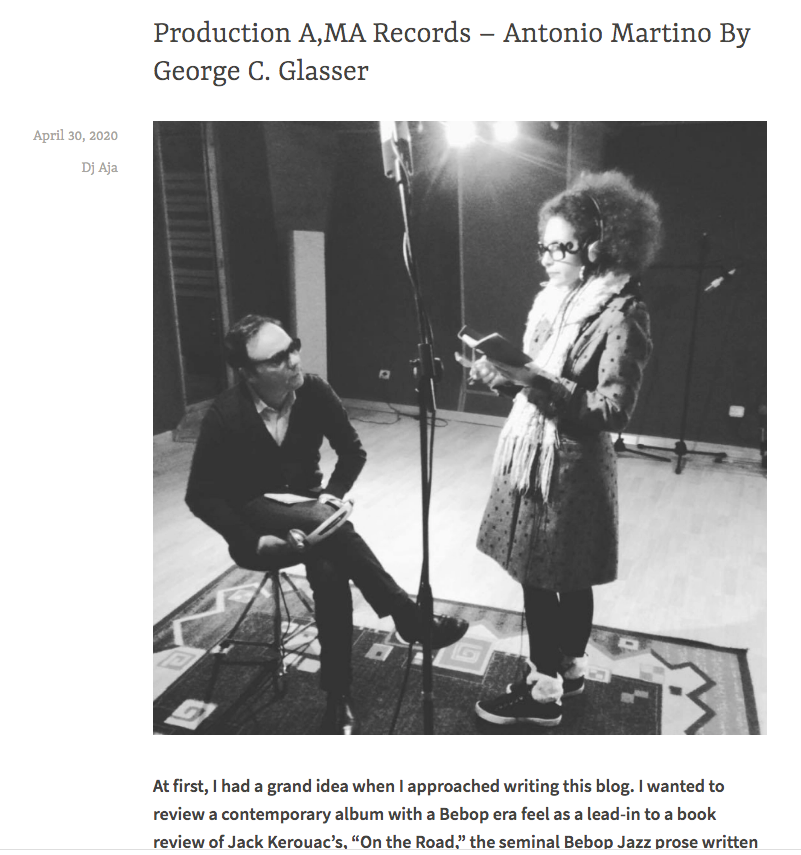At first, I had a grand idea when I approached writing this blog. I wanted to review a contemporary album with a Bebop era feel as a lead-in to a book review of Jack Kerouac’s, “On the Road,” the seminal Bebop Jazz prose written in three weeks on a roll of teletype paper. The book influenced a generation. The blog was going to be how Jazz related to prose and poetry, and Kerouac exemplified that in his Bebop style writing.
When I’m looking for a contemporary Jazz artist for a specific reason, I go to Antonio Martino at A.MA Records and ask him to send me over a few people from his catalog to listen too. I’ve reviewed his artists in the past and Antonio knows my tastes.
After we exchanged a few emails, I decided to focus on Martino as a producer because, without a good producer, the musicians can be excellent, but their work suffers and often goes unnoticed because of poor production quality.
While I might not be keen on some of the artists on his label because my tastes lean more toward a hard-edged, frenetic driving sound, Martino almost always has someone that catches my attention.
If we were back in the heyday of Jazz, the A.MA label would be my Blue Note, Riverside, or Concord recording companies to check out new talent because of recording quality and the A&R staff’s knowledge of Jazz.
Martino always produces quality acts, and in my opinion, he is a master at production and A&R – he knows what a band should sound like, not what a neophyte producer and tin-eared engineer thinks they should sound like.
Martino has the trifecta of having a stable of excellent artists, excellent production, and an excellent sound engineer (Tullio Ciriello). Both Martino and Ciriello are sympathetic to the music and the end products are like sitting in the studio while the group is playing.
They capture the nuance of how a group’s sound bleeds together in a live performance, and more importantly, the ambiance of the rhythm section laying down a solid foundation for the other instruments/vocals.
In a lot of material I hear, the instruments are isolated on separate tracks and by the time they’re finished sanitizing the percussion, they might as well have used a drum machine or someone hammering tin cans.
Ciriello and Martino have a knack for capturing the richness of a good rhythm section and balancing solos so they don’t sound like they were afterthoughts or spliced together in some remix of greatest hits done on an iPad.
asked Martino about his approach to production:
“As a producer, I carefully choose Jazz projects that are rooted in tradition – the blues and New Orleans styles – but at the same time have a contemporary sensibility.
“I love the 1950/60’s Blue Note, Riverside, and Atlantic labels’ sound. I love that live feel the recordings have.
“With my sound engineer, Tullio Ciriello, we try to reproduce that sound. We are very careful to record the drums/percussion, that is for me is essential. Before the session begins. It takes longer to establish the sound levels for the drums than the other instruments.
“When I work on a project from the beginning with the musicians, I shape the music, giving them suggestions and hints of what I have in mind.
“When I receive an album already recorded, I decide to release it only if I feel it is in the same direction of the label catalog. I refuse many records, not because they are badly played but because I don’t feel the music follows the direction I have in mind.
The other very important factor in my production style is the human factor, the relationship I establish with the musicians. I must like their music first, but I also must like who they are.”
Of course, problems may arise when people do not see eye to eye with each other, but with the exception of two projects, I have become great friends with all the musicians.
“The artists like me, they trust my work and advice. That’s why when I created A.MA Records, the first thing I invested in was my own recording studio so that the musicians could work at ease, without pressure, and in a relaxed environment without worrying about paying the studio and do things in a rush. Also, I have access to the recording and work together directing the sound in a way I feel to be the best for both of us.”
